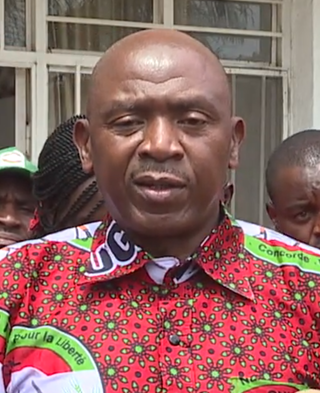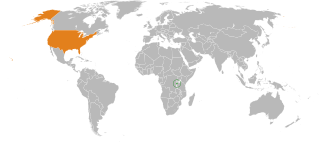Communications in Burundi include radio, television, fixed and mobile telephones, the Internet, and the postal service in Burundi.
The BurundiNational Defence Force is the state military organisation responsible for the defence of Burundi.

Burundi originated in the 16th century as a small kingdom in the African Great Lakes region. After European contact, it was united with the Kingdom of Rwanda, becoming the colony of Ruanda-Urundi - first colonised by Germany and then by Belgium. The colony gained independence in 1962, and split once again into Rwanda and Burundi. It is one of the few countries in Africa to be a direct territorial continuation of a pre-colonial era African state.

Burundi is divided into eighteen provinces, each named after their respective capital with the exception of Bujumbura Rural.

The Burundian Civil War was a civil war in Burundi lasting from 1993 to 2005. The civil war was the result of longstanding ethnic divisions between the Hutu and the Tutsi ethnic groups. The conflict began following the first multi-party elections in the country since its independence from Belgium in 1962, and is seen as formally ending with the swearing-in of President Pierre Nkurunziza in August 2005. Children were widely used by both sides in the war. The estimated death toll stands at 300,000.

The National Council for the Defense of Democracy – Forces for the Defense of Democracy is the major political party in Burundi. During the Burundian Civil War, the CNDD–FDD was the most significant rebel group active and became a major political party in Burundi. The party's rule has been described as authoritarian.

The Council of Ministers of Burundi are the senior level of the executive branch of Burundi and consists of the Prime Minister of Burundi and various Ministers. The 2018 constitution, which enshrines ethnically based power-sharing, requires that at most 60% of ministers come from the ethnic Hutu majority and at most 40% hail from the Tutsi minority. At least 30% of government ministers must be women. The members of the council are directly appointed by the President in consultation with the Vice-President and Prime minister.
The Province of the Anglican Church of Burundi is a province of the Anglican Communion, located in East Africa between Tanzania, Rwanda, Kenya, and the Congo. The Archbishop and Primate of Burundi is Sixbert Macumi.

Agathon Rwasa is a Burundian politician and the leader of the National Liberation Forces. He was a Hutu militia leader during the Burundi Civil War.

In 1962, the United States established diplomatic relations with Burundi when it gained its independence from Belgium. Following independence, the country experienced political assassinations, ethnic violence, and cyclical periods of armed conflict; several governments were installed through coups. The 2000 Arusha Peace and Reconciliation Agreement provided a negotiated settlement framework that, along with later ceasefire agreements, led to the end of the 1993-2006 civil war. President Pierre Nkurunziza's decision to seek a third presidential term in 2015 sparked protests in the capital and was followed by a failed coup d’état. The resultant violence and political and economic crises resulted in massive refugee flows to neighboring countries. The United States Embassy in Burundi's policy states: "The United States supports the achievement of long-term stability and prosperity in Burundi through broad, inclusive reconciliation; humanitarian assistance; economic growth; and the promotion of political openness and expansion of democratic freedoms. The United States supports the East African Community (EAC)-facilitated Burundian dialogue and other conflict resolution efforts within Burundi. The United States seeks to facilitate Burundi's deeper integration into regional and international markets, as a means to promote sustainable economic development."
Alexis Sinduhije is a Burundian journalist and politician. After founding Radio Publique Africaine during the Burundi Civil War, Sinduhije received a CPJ International Press Freedom Award and was named to the Time 100 list of most influential people. In 2007, he left journalism to run for president, but was arrested in 2008 on a charge of "insulting the president," Pierre Nkurunziza, drawing protests on his behalf from the U.S., U.K., and Amnesty International. He was found not guilty and released in 2009. The film "Kamenge, Northern Quarters" follows Sinduhije before, during, and after his incarceration.
There are several planned railway lines in Rwanda, including a line to Tanzania. Historical railways are limited to three industrial railways.

Tourism in Burundi refers to tourism in Burundi. Bujumbura, the largest city and former capital of Burundi, is a major tourist attraction of the country. In addition to this, Lake Tanganyika is a popular tourist attraction.
Mitakataka, from "Umutakataka", a tree originating from Burundi, is a village in the Commune of Bubanza in Bubanza Province in north western Burundi. It is one of the province's most populous villages and is home to Canal River, an irrigation artificial river created in the aftermath of the country's decolonization. Notable people from the village are the honourable Manasse Nzobonimpa, a member of the Assembly and former governor of Bubanza and Nyabenda Pascal, a former president of the CNDD-FDD party.
Musenyi is a village in the Commune of Tangara in Ngozi Province in north Burundi.

Burundi participated in the 2008 Summer Olympics, held in Beijing, China from 8 to 24 August 2008. It was Burundi's fourth appearance in the summer Olympics since its debut in 1996. The Burundi team included three athletes: runners Joachim Nshimirimana and Francine Niyonizigiye, as well as swimmer Elsie Uwamahoro. Niyonizigiye, a marathon runner, was flag bearer for the opening ceremony. None of the Burundi athletes progressed further than the qualifying round.

Burundi, officially the Republic of Burundi, is a landlocked country in the Great Rift Valley at the junction between the African Great Lakes region and East Africa. It is bordered by Rwanda to the north, Tanzania to the east and southeast, and the Democratic Republic of the Congo to the west; Lake Tanganyika lies along its southwestern border. The capital cities are Gitega and Bujumbura, the latter being the country's largest city.

Ezéchiel Nibigira is the current Minister of Foreign Affairs of the Republic of Burundi. He was previously Ambassador of Burundi in Kenya and leader of the youth wing of Burundi's ruling party CNDD-FDD. He was also a Member of Parliament representing Bujumbura rural where he chaired Burundi's parliament's Finance committee. Prior to his current post Nibigira was head of Burundi's customs as well as imports and exports. During President Pierre Nkurunziza's 2010 elections campaign, Nibigira was a chief campaign manager. Nibigira earned a Bachelor of Arts degree in Business from Hope Africa University.

On 25 April 2015, the ruling political party in Burundi, the National Council for the Defense of Democracy – Forces for the Defense of Democracy (CNDD-FDD), announced that the incumbent President of Burundi, Pierre Nkurunziza, would run for a third term in the 2015 presidential election. The announcement sparked protests by those opposed to Nkurunziza seeking a third term in office.

General Évariste Ndayishimiye is a Burundian politician who has served as the tenth President of Burundi since 18 June 2020. He became involved in the rebel National Council for the Defense of Democracy – Forces for the Defense of Democracy during the Burundian Civil War and rose up the ranks of its militia. At the end of the conflict, he entered the Burundian Army and held a number of political offices under the auspices of President Pierre Nkurunziza. Nkurunziza endorsed Ndayishimiye as his successor ahead of the 2020 elections which he won with a large majority.











